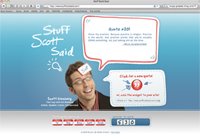 Are you a trusted source who moves people with innovative ideas?
Are you a trusted source who moves people with innovative ideas?
If so, then you’re a Thought Leader.
You don’t need a PhD.
You don’t need to be Tom Peters.
You don’t need to manage some huge consulting company.
You just need to think.
AND: You need to capture, organize, deploy and build a following around your thinking.
Consider this collection of tools for increasing your perception as a Thought Leader:
1. Create a Visibility Plan. When attention is currency, anonymity is bankruptcy. As the book On Being a Thought Leader explained, “It’s impossible to change minds or challenge hearts unless you own SOME of the spotlight.”
Remember: Nobody will be inspired BY you until they’ve heard OF you. Stop winking in the dark and start commandeering attention. Because the more attention you attract the more people your thoughts can touch. How much more visible are you than you were a year ago?
2. Create enduring content. Anchor your expertise in that which is timeless. Democratize and genericize your thoughts so they outlast you. Always be on the lookout for ways to increase the shelf life of your material. Ask questions like, “In five years, will this idea still be irrelevant?” “Is this a fad, a trend or an evergreen?” and “What is a bigger, more stable theory of the universe that I can attach this idea to?”
Remember: If you’re not current, you’re not credible. Always run your expertise through the wringer of WHEN. How stable is your philosophy?
3. Dedicate yourself to building a HOT body. It’s not about writing one book. Or one article. Or one blog post. You’re a thinker. And as such, your goal is to constantly add to and strengthen your body of work. Don’t be a One Hit Wonder, One Trick Pony or One Anything Anything.
As Julia Cameron said in The Artist’s Way, “Each day’s work is part of a larger body of work, and that body of work is the work of a lifetime. Unless we are able to take this long view, we will be derailed by rejection.” Edison registered 1,800 patents. The Grateful Dead played 2,318 shows. Stephen King published 480 books. How hot is YOUR body of work?
4. Develop an ongoing relationship with your market. Combine outreach with attraction. Make it easy for readers, subscribers and audience members to engage with you, every day. Ask for their feedback. Take heed. Take notes. They will tell you how to serve them better. They will also tell you how to sell to them better. What’s your listening platform?
5. Everything you already know about “leadership” still applies. You’re still attracting followers. You’re still a perpetrator of inspiration. You’re still superior article. And you’re still a composite of all you’ve experienced. The only difference is, the medium through which these attributes are experienced by your constituency is your brainstuff. Your thoughts. Your words. Your philosophies. Your writings. Your presentations.
You don’t need a title, a corporation or a gavel to be a leader. There is no leadership. Leadership, shmeadership. There is only being and expressing yourself truthfully and passionately. Does that describe you?
6. Have a paper memory. Your brain is a moron. And if you don’t write it down, it never happened. So, the secret is simple: Take a serious inventory of your thoughts. Chronicle your thinking. Make sure everything you know is written down somewhere. Develop a unique process for entertaining ideas. What’s your Content Management System?
7. Make your ideas more accessible. Accessibility doesn’t just apply to interpersonal communication. Ideas can be accessible too. Here are four examples along with a helpful article on each one:
a. Don’t just tell a story. Stick the landing.
b. Don’t just write a blog. Be a great date for your reader.
c. Don’t just deliver a presentation. Engage every audience instantly.
d. Don’t just give an interview. Craft a listenable, unforgettable telepresence.
Remember: Accessible means easy. Open. Relaxed. Attainable. Understandable. Relatable. Is that an accurate description of your ideas?
8. Mold a beautiful thought atmosphere for yourself. This space looks different for everyone. For example, my thought atmosphere includes hot tea, a rising sun, sticky notes, dry erase boards, flip charts, note cards on the floor, instant access to my content management system and hours of relaxing music by All India Radio, Marc Cohn and The Buddha Lounge. What does yours look like?
9. Smart is overrated – be an intellectual. My mentor, Bill Jenkins, is one of the great intellectuals I know. He explained the difference between the two as follows: “Smart people study content for the purposes of memorization. Intellectuals entertain ideas for the purpose of democratization.”
Look: The world has too many smart people and not enough intellectuals. So, stop accumulating knowledge and start becoming an explorer of ideas who can extract universal truths from his experiences and apply them to anyone, anytime, anywhere. Are you an intellectual or just really smart?
10. Syndicate your expertise. Deploy, deploy, deploy! Go public with your words, ideas, philosophies, expertise and School of Thought. Fortunately, it’s easier than ever. And considering the sheer volume of diverse social media tools available, there is NO excuse for not getting your ideas out there and creating more opportunities for people to say YES to your expertise.
Remember: Be out IN the marketplace with your ideas or be out OF the marketplace completely. What’s your system for shipping your idea off to battle?
REMEMBER: You don’t have to be Tom Peters to be a Thought Leader.
Think. Capture. Organize. Deploy. Listen. Repeat.
LET ME ASK YA THIS…
How strong is your Thought Leadership Platform?
LET ME SUGGEST THIS…
For the list called, “17 Reasons to Write a Free Ebook,” send an email to me, and you win the list for free!
* * * *
Scott Ginsberg
That Guy with the Nametag
Author, Speaker, Coach, Entrepreneur
[email protected]
 Need to build your Thought Leadership Platform?
Need to build your Thought Leadership Platform?
Perhaps my monthly (or yearly) coaching program would help.
Rent Scott’s Brain today!

 People who complain that they can’t find any good ideas should their vision checked.
People who complain that they can’t find any good ideas should their vision checked.  Who’s quoting YOU?
Who’s quoting YOU? “Passionate” doesn’t (necessarily) mean “profitable.”
“Passionate” doesn’t (necessarily) mean “profitable.” Download a free copy of The Nametag Guy’s (unofficial) 9th book!
Download a free copy of The Nametag Guy’s (unofficial) 9th book! Chopin once remarked, “Simplicity is the final achievement. After one has played a vast quantity of notes and more notes, it is simplicity that emerges as the crowning reward of art.”
Chopin once remarked, “Simplicity is the final achievement. After one has played a vast quantity of notes and more notes, it is simplicity that emerges as the crowning reward of art.”
 “I need more bookings!”
“I need more bookings!” “Ideas are free, execution is priceless.”
“Ideas are free, execution is priceless.” If you google the word “nametag,” it points to me first.
If you google the word “nametag,” it points to me first. On July 24th, 2008, The New York Times published an
On July 24th, 2008, The New York Times published an  Download a free copy of The Nametag Guy’s (unofficial) 9th book!
Download a free copy of The Nametag Guy’s (unofficial) 9th book! 1. Don’t try, seek or set out to be a Thought Leader. You earn this honorable designation when the world dubs you so. Furthermore, being a Thought Leader isn’t an intentional goal – it’s an incidental consequence.
1. Don’t try, seek or set out to be a Thought Leader. You earn this honorable designation when the world dubs you so. Furthermore, being a Thought Leader isn’t an intentional goal – it’s an incidental consequence.  Have you ever been SO hungry that you actually considered cannibalism?
Have you ever been SO hungry that you actually considered cannibalism?